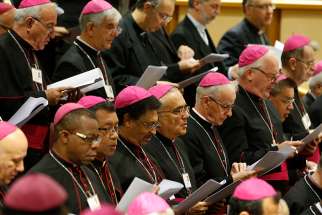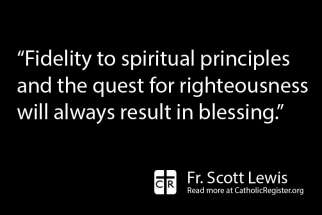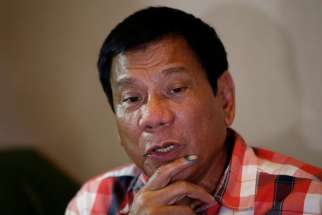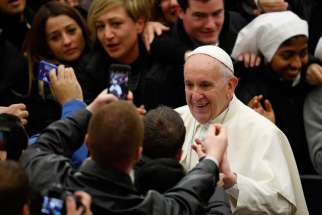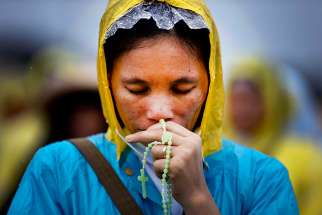The power of spiritual principles
32nd Sunday in Ordinary Time (Year C) Nov. 6 (2 Maccabees 7:1-2, 7, 9-14; Psalm 17; 2 Thessalonians 2:16-3:5; Luke 20:27-38
How should we react when negative events shake us to our core and raise doubts?
MANILA, Philippines – The head of the Philippine bishops' conference said it was time to "get up" and be faithful to God, as millions of Filipinos elected Davao City Mayor Rodrigo Duterte president.
Faithfulness in mercy is God's way of being, Pope says
VATICAN CITY - God's mercy is constant and limitless; he is faithful in his mercy for his children, even when they are unfaithful, Pope Francis said.
Pope: Prayers of the faithful, not clergy, can make miracles happen
VATICAN CITY - The prayers of the faithful, not the pope, bishops, priests or nuns, have the power to make miracles happen in the most impossible situations, Pope Francis said at his morning Mass.
O come to church all ye faithful, sort of faithful and atheists, too
December means curtains up for church Christmas pageants, hand-bell concerts, caroling kiddie choirs and Nativity displays on the front lawns.
BETHLEHEM - The faithful began arriving in Manger Square four hours in advance of Pope Francis' appearance, waving flags, shaking hands, buzzing with excitement. With three hours to go the people are singing hymns.
Faithful charity
Engaging in charity is central to the mission of the Church or, as Pope Benedict says, “an indispensable expression of her very being.” For 2,000 years, charity has been such an obvious aspect of Christian identity that it was never expressly established in Canon Law as a duty of the bishops. There was no need. It was simply acknowledged by all as being a fundamental teaching of Christ and therefore essential to the practise of the faith.
That changed on Dec. 1 when the Pope issued an apostolic letter to formalize regulations to govern the Church’s charitable activities. He did this, he said, because there was a need to fill a lacuna, the gap between what was being enthusiastically practised but without a legislated framework.
His document will be warmly received by generous Catholics who’ve expressed concern about their donations sometimes going, directly or indirectly, to causes that conflict with Church teaching. In Canada, the most public of these cases involve a small number of agencies affiliated with Development and Peace. Even today, D&P continues to hear occasional suggestions that, despite tighter controls, some of its money finds its way to groups that support abortion.
Benedict’s welcomed decree is a succinct reflection on the essential nature of charity and its integral place in the Church. It’s a call for charities to exemplify Christian life, for the laity to engage in charitable activity and for bishops to provide firm leadership and strict oversight.
Most striking, though, is the Pope’s unequivocal edict that Catholic charities always act in accordance with Church doctrine.
Without exception, they “are required to follow Catholic principles in their activity and they may not accept commitments which could in any way affect the observance of those principles,” he said. He has also prohibited these charities from accepting financial support from groups that contravene Church teaching.
Additionally, dioceses and parishes are instructed to prohibit publicity for charitable organizations that contravene Church teaching. The Pope makes it the duty of bishops in particular but also pastors to “ensure that they (charities) are managed in conformity with the demands of the Church’s teaching and the intentions of the faithful.”
These are welcomed words. When Catholics support a Catholic charity they have every right to expect their money is supporting causes that align with their faith. For many years, everyone assumed that was the case. Several recent incidents, however, suggest that has not always been so.
The Pope has now decreed that being faithful is more than merely expected of Catholic charities. It is mandatory. These charities are obligated to strictly adhere to Church doctrine and bishops are formally required to ensure that charities comply.
It’s all about ensuring that Catholic charities are, in every respect, truly Catholic.


